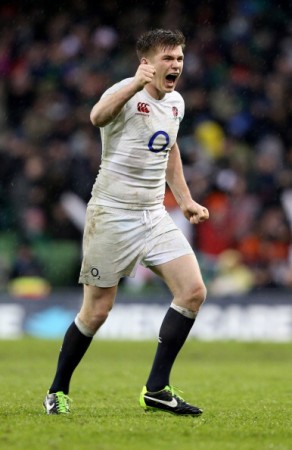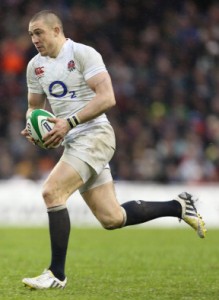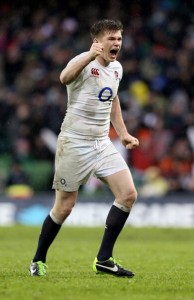
On the ball: Chris Robshaw pounces on a prone Ronan O'Gara in an attempt to win a turnover during England's win
By Alex Lowe
ENGLAND’S 12-6 victory over Ireland in Dublin was the biggest achievement of the Stuart Lancaster regime. It was a coming-of-age performance.
Yes, beating world champions New Zealand in December was remarkable but that was a one-off performance, achieved when England had nothing to lose.
England are now achieving the “consistency with a winning edge” that they craved for 2013. Two victories, secured in contrasting styles, have left them top of the Six Nations table. Here’s how they won in Dublin…
Intensity
England’s mantra in Dublin was ‘no backward step’. That applied to everything they did, even when the scuffles broke out off the ball. The England players had each others’ backs and that attitude, right from the kick-off, underpinned their performance.
The majority of the squad were not scarred by the defeat two years ago, which had cost Martin Johnson’s team the Grand Slam, but they understood why it had happened, why no England team had won a Six Nations game in Dublin for a decade. They had seen Ireland blitz Wales in the first half in Cardiff and knew the tone had to be set early.
This was the biggest test of their young character since Stuart Lancaster took charge and England refused to concede anything in the passion stakes.
That led to a ferocious contest – a mano-a-mano battle of brute force – and it was the more experienced Ireland who eventually cracked as England controlled the final quarter.
In their grill
Ireland’s game was riddled with handling errors, some of which were down to the incessant rain but many were due to the pressure England’s defence put them under.
In the first half, England succeeded in knocking the ball loose in the tackle. The second half was more about their line speed and their kick-chase choking Ireland’s attacking options.
Chris Robshaw led from the front and he was joined by the likes of Courtney Lawes, Owen Farrell and Joe Marler who all tackled like rabid dogs.
Ronan O’Gara found his time and space cut dramatically and even a man of his experience struggled under that pressure, his composure squeezed out of him by England’s suffocating defence.
In the bin
Ireland’s best period of the game came just after the interval. The emerald pack won successive scrum penalties and O’Gara had kicked Ireland onto the scoreboard when James Haskell was sin-binned for disrupting the ball as he wriggled out of a ruck.
If it was a touch harsh in isolation, Haskell took the fall for a series of England penalties and O’Gara drew the scores level. It looked like being a decisive ten minutes. It was – but not how you imagine.
England kept their composure, played smart rugby and won that sin-bin period 6-3. Mike Brown was heavily influential in that turnaround, twice putting the pressure on Rob Kearney, which led to Ireland conceding penalties.
In the head
While England were ferocious, they were also calm, smart and composed. England recognised the value of playing without the ball and, confident in their defence, they were happy to allow Ireland to keep possession.
Alex Goode played with real control from full-back, anticipating Ireland’s kicking game and bettering it to push England back downfield.
England’s maturity was most evident when Haskell was off the field and they managed that period expertly. Andy Farrell described it as “a masterclass”. He was right.
In the bag?
The last time England won a Six Nations game in Dublin they won the Grand Slam. Time for history to repeat itself? On the evidence of the first two weekends, the answer is yes. England have won twice, in two contrasting styles, to sit top of the pile. But it is not in the bag yet. A wounded France will be a significant test in a fortnight followed by Italy and then a tough trip to Cardiff.
“We came here to put a marker down,” Robshaw said. England should fear nothing now.
Follow Alex Lowe on Twitter @AlexMLowe








